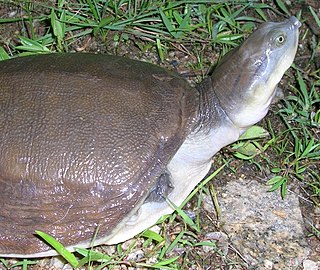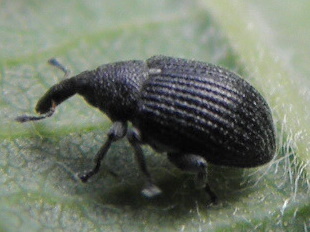
The brahminy river turtle or crowned river turtle is a species of turtle in the family Geoemydidae. The species is endemic to South Asia.

Lissemys is a genus of softshell turtles in the subfamily Cyclanorbinae of the family Trionychidae. The genus is indigenous to southern Asia.
Armintomys was a genus of extinct rodent from North America related to jerboas and jumping mice. It is the only genus in the family Armintomyidae. It is the oldest known example of a hystricomorphous zygomasseteric dentition, and lived during the early Eocene.

Alsophis is a genus of snakes in the subfamily Dipsadinae of the family Colubridae. Species in the genus Alsophis are among those snakes commonly called "racers". Alsophis species occur throughout the Caribbean. One species in the genus Alsophis, A. antiguae, is one of the world's rarest known snakes. Snakes of the genus Alsophis are small and rear-fanged, and they are considered harmless to humans. This genus contains nine described species which are recognized as being valid. Several species once included in this genus have been placed in the genera Borikenophis and Pseudalsophis.

Herpestes is a genus within the mongoose family Herpestidae. Several species in the family are known as slender mongooses. It is the type genus of the family, and comprises 5-6 living species, each with several subspecies. Fossil remains of three prehistoric species were excavated in France, and described in 1853.
Vinceria is an extinct genus of kannemeyeriiform dicynodont in the family Shansiodontidae. Fossils of the genus have been found in the Anisian Cerro de las Cabras Formation and Carnian Río Seco de la Quebrada Formation of Argentina. One species, C. argentinensis, named in 1966, was moved to its own genus, Acratophorus, in 2021. Another species, V. vieja, was merged with Acratophorus argentinensis in 2021, leaving V. andina as the only species in the genus.

Coleocentrus is a genus of parasitoid wasp from the ichneumonid family.

Acratophorus is an extinct genus of kannemeyeriid dicynodont that lived during the Anisian age of the Middle Triassic-aged Río Seco de la Quebrada Formation in what is now Argentina. The type species, A. argentinensis, was originally placed in the genus Kannemeyeria by Jose Bonaparte in 1966, and later sometimes referred to Vinceria, before being transferred to a new, distinct genus, Acratophorus, in 2021 by Christian Kammerer and Angi Ordoñez. The species Vinceria vieja was also made a synonym of A. argentinensis in 2021. The holotype is PVL 3645, a partial skeleton discovered near a farm house in Puesto Viejo.
Sinognathus is an extinct genus of gomphodont cynodonts from the Middle Triassic Ermaying Formation of China. Its type and only species is Sinognathus gracilis, which was named in 1959 by the Chinese palaeontologist C. C. Young.
Kaltenbachiella is a genus of insect belonging to the family Aphididae.

Anoplus is a genus of beetle belonging to the family Curculionidae.
Anthobium is a genus of beetles belonging to the family Staphylinidae.

Anthophagus is a genus of beetles belonging to the family Staphylinidae.
Aphanus is a genus of true bugs belonging to the family Lygaeidae.
Arrhenopeplus is a genus of beetles belonging to the family Staphylinidae.
Atractides is a genus of mites belonging to the family Hygrobatidae.

Brachysomus is a genus of beetles belonging to the family Curculionidae.
Cyphon is a genus of beetles belonging to the family Scirtidae.
Erotesis is a genus of insects belonging to the family Leptoceridae.
Propappus is a genus of annelids belonging to the monotypic family Propappidae.









